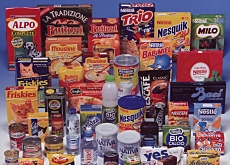Brabeck reveals what keeps Nestlé on top

After reporting bumper profits on Thursday, Nestlé chairman and chief executive Peter Brabeck told swissinfo how he keeps ahead of the competition.
Brabeck, an Austrian who has been head of Nestlé since 1997, also says he intends to step down as CEO at the annual shareholders’ meeting in 2008.
The company, based at Vevey on Lake Geneva, said net profit for 2005 jumped more than 20 per cent to SFr7.995 billion ($6.1 billion) on sales of just over SFr91 billion.
Brabeck says Nestlé – the world’s largest food company – keeps ahead of the competition through continual innovation, both in research and development and in management practice.
swissinfo: How does your strategy differ from that of the competition in the food industry?
Peter Brabeck: For many, many years we were the one company that spent most on research and development. This is an accumulated know-how that we have today.
We went global before anybody else. In 1921 we built our first factories in Latin America. We didn’t invent globalisation in the 1990s or at the beginning of this century. We did it 100 years before, which gives us a very global presence.
We have always believed that there are no global consumers. We believe that every consumer is an individual – a local individual – so therefore we have to take care of him individually. All those things make us very competitive and appreciated by our consumers.
swissinfo: Many people feel Nestlé is very conservative and doesn’t change very much. You’ve mentioned though that your structures have been changing. What’s taking place exactly?
P.B.: I think we have been changing all our life [as a company] otherwise we wouldn’t be 140 years young if we hadn’t changed in all that time.
Change for us is not a special event and we don’t make revolutions… change is part of our strategy. Twenty per cent of our products are changed every year. This is enormous. Our culture is not changing but the way we’re doing business is changing all the time.
swissinfo: You spoke of Nestlé as an armada but the Spanish armada floundered. How do you manage your armada? You’ve talked about decentralisation as a key factor.
P.B.: Decentralisation is very important and what we have been doing is breaking up the super tanker that we are and were.
We are not trying any more to have one business model for all of our businesses. We put specific models to specific businesses but we also have to ensure there is a one “commander boat” and one commander and there is a common supply boat and supply chain.
We are decentralising in what we call the generating demand function, which is everything that the consumer can perceive. But we are centralising in order to leverage the size of everything the customer cannot see. Manufacturing can be regionalised, supply can be globalised and purchasing can be globalised… so you have a mixed bag.
swissinfo: You say that Nestlé doesn’t create value for its shareholders alone. Who else do you create value for?
P.B.: We believe in the concept of shared value, not only shareholder value, and this shared value goes clearly to all the countries and communities that we’re working in.
But it also goes to all the millions of farmers who are working exclusively for us. It goes to the 250,000 people who are our employees, it goes to our suppliers and it goes to our trade partners. If you’re really managing a company for the long term, you achieve sharing the values with all the stakeholders that are close to you.
swissinfo: How do you view the hard discounters? Do you fear them at all?
P.B.: Hard discounters are not very new. Don’t forget that the first discounter that existed – at least in my perception – is Switzerland’s Migros. This was decades ago.
Very interestingly when I first joined Nestlé, and even when I became CEO, there was basically no relationship between Migros and Nestlé. Today you can go to Migros and you will find San Pellegrino, Vittel, our pet food products and confectionery products, so I think we have learned to live with hard discounters.
Last year sales to hard discounters in western Europe were more than SFr1 billion with a growth of 20 per cent, so I cannot fear my trade partner. I have to appreciate my trade partner.
swissinfo: You’ve been highly successful here at Nestlé over the years. What’s left for you to do?
P.B.: I want to see that we finish the transformation process both strategically –we are in the middle of that – and also operationally.
I think you will see that I have rejuvenated the general management and the executive board and I think this process should come to an end by the general assembly [of shareholders] of 2008… This would be perhaps the right moment for me to say goodbye as CEO.
swissinfo-interview: Robert Brookes in Vevey
Sales: SFr91.075 billion
Operating profit: (Ebita): SFr11.720
Net profit: SFr7.995 billion (+20.7%)
Organic growth: 6.2%
Real internal growth: 4.2%
Nestlé was founded in 1866 by Henri Nestlé and is today the world’s biggest food and beverage company.
The company employs around 247,000 people and has factories or operations in almost every country in the world.
Last year sales in the United States overtook those in Europe for the first time.
Nestlé has been strengthening its position in the US by buying other firms.

In compliance with the JTI standards
More: SWI swissinfo.ch certified by the Journalism Trust Initiative











You can find an overview of ongoing debates with our journalists here . Please join us!
If you want to start a conversation about a topic raised in this article or want to report factual errors, email us at english@swissinfo.ch.